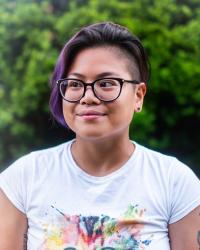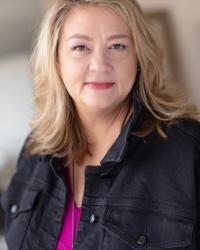RaceB4Race Social Media Fellows
RaceB4Race aims to create opportunities for public engagement with premodern critical race studies, bringing broader attention to more complete and accurate narratives about the past and its modern uses. To do so, we must equip public intellectuals undergoing this work with skills and knowledge to protect their personal safety in digital spaces.
Feminists and Black, Indigenous, and People of Color have frequently been the targets of online harassment. As the political rhetoric and maneuvers have increased against critical race theory, doing antiracist work online in social media spaces may put RaceB4Race scholars in the crosshairs of online harassment. We believe that we need to equip our scholars with information, strategies, and structural support before they decide to do public antiracist work.
2024 fellowship program
The RaceB4Race Social Media Fellows program, directed by Dorothy Kim at Brandeis University, invites applications for the 2024 cohort. Fellows will participate in a series of digital safety workshops, will complete required readings, and will use the skills they learn to develop a strategy for digital safety to implement in their home institution. Fellows will receive a stipend of $4,500 at the completion of the program.
How to apply
Please use the application platform to submit your CV and a 300 word description of the kind of antiracist public social media work you'd like to do. We are not currently accepting applications.
Please feel free to contact Dorothy Kim (dorothykim@brandeis.edu) with any questions.
Schedule of workshops
'Racism in the Ecology of Content Moderation' with Rae Jereza
February 2, 2024
Shadow banning creators of color while leaving up racist content? How do we make sense of mainstream social media companies' practices around race and racism? Drawing on Dr. Rae Jereza's work on Facebook & Instagram content moderation, this workshop will focus on third-party content moderation companies to reveal the mundane, neoliberal labor practices that discipline content moderators into abiding by colorblind ideologies. While companies do make exceptions for "high-profile" users (e.g., celebrities and politicians), we will turn our attention to the ways that average users' posts are screened and processed. This workshop will thus highlight the ways in which social media's political economy constitutes a site of reproduction for racism to thrive, enabling supremacist movements to recruit from the so-called mainstream.
Rae Jereza is a research assistant professor and senior researcher at the Polarization and Extremism Research Innovation Lab (PERIL) at American University. They research content moderation, the hate speech/free speech dichotomy, gun violence, and the far right.
"The Line in The Sand, the Speech for the Chair " with Sydette Harry
March 1, 2024
Online space making for “non-digital “ specialties is a necessity, and tells important work about the nature of labor in creation--especially at moments of new creation, epistemologically, creatively, and in terms of labor.
The fighter draws a line in the sand to declare their place and announce them as a fighter. It also changes the nature of engagement or the rule from one “boss” to the next. In “ Into the Badlands,” a descendent of martial arts films and sci-fi and post-apocalyptic technology, the Showrunner, Latoya Morgan , also was instrumental in a cohort that mounted a labor action in #WGAstaffingboost. Fighting the practices of “packaging” and labor institutions, C.S Lewis, in “De Descriptione Temporum,” looks at the possibilities and conundrums of defining medium within the confines of institutions. What are material moments of definition, and what extra work (fights) can they cause and magic can they create? How can that be applied to work you do (want to do) and what allies and interests can we bring together that are usually kept apart? Also watching things get punched!
Sydette Harry is a Far Rock/Guyanese researcher, writer and strategist concentrating on mass communications, informational health, and people centered technology. She is a Senior Civic Media Innovation Fellow with USC Annenberg and has spoken at the UN, Code for America, Google Newsgeist and Open News. Her work has appeared in Wired, The Rockaway Advocate, Salon, and more. She is the Manager of Communications, Content and Community at Mozilla Rally.
How We Defeat the Far Right + Why We Have to Deal with Whiteness
March 22, 2024
My current project is a large, collaborative, qualitative project designed to understand what are the most effective strategies for combatting the far right in three overlapping domains, in the streets, online, and around the world. In scoping reviews of the literature, there is very little research that focuses on solutions. Further, there is very little in the existing literature that situates the research that is self-reflexive. In a field that is driven by predominantly white researchers, the lack of self-reflection in the field obstructs a clear analysis of how we defeat the far right. In order to defeat the far right, we have to confront global white supremacy.
Jessie Daniels, PhD is Professor of Sociology at Hunter College and The Graduate Center, CUNY. She is an internationally recognized expert on internet manifestations of racism, and the author of several books, including White Lies (Routledge,1997) and Cyber Racism (Rowman & Littlefield, 2009), which examine white supremacist ideology on either side of the rise of the popular internet. Recent articles on this topic include, “The Algorithmic Rise of the Alt-Right,” (2018) and “Twitter and White Supremacy: A Love Story” (2017). She is at work on a new book that focuses on those combatting white supremacy in the streets, online and around the world. Her latest book, Nice White Ladies: The Truth about White Supremacy, Our Role In It, and How We Can Help Dismantle It (Seal Press, 2021), was listed as one of the Best Nonfiction Titles of 2021 by Kirkus Reviews.
Social Media in the Interregnum: Survival Strategies
April 12, 2024
Ra’il l’Nasah Kiam
Looking at the current state of social media platforms, it is difficult not to conclude that their once-lauded ability to allow everyday people to “speak truth to power” has been severely curtailed. Between the intensification of the attention economy, the corresponding monetization of engagement metrics, the deliberate erosion of already-imperfect moderation practices, and the limited reach of alternative sites, social media users are facing intensifying challenges in their attempts to organize, to archive, and to connect.
In this workshop, we will create a deliberate space to confront these antagonisms and sit with the contradictions of “trying to make a way out of no way.” More specifically, we will think through how we can begin to develop counter-technologies to the silencing and atomizing actions taken by these companies as the pursue their own interests. How can we maintain the networks that we have joined or created over the course of our online lives? How can we protect and amplify voices that slip through the cracks of various algorithms? How can we persevere the work that is done in these spaces for those communities and those moments in time that exist beyond the boundaries of the digital?
David Kim, Associate with Gladstein, Reif, and Meginniss
May 3, 2024
Mr. Kim was an Assistant Attorney General in the fellowship program at the Massachusetts Attorney General’s Office, where he specialized in consumer protection and administrative law matters. He received his juris doctor from Harvard Law School. During law school, he was a member of the Harvard Legal Aid Bureau and represented clients in housing and employment matters. After graduation, he clerked for Justice Kimberly S. Budd of the Massachusetts Supreme Judicial Court. Prior to law school, he worked as an investigator for the Orleans Public Defenders and as a legal assistant for a civil rights law practice in New York City. He received his bachelor’s degree from Harvard College.

